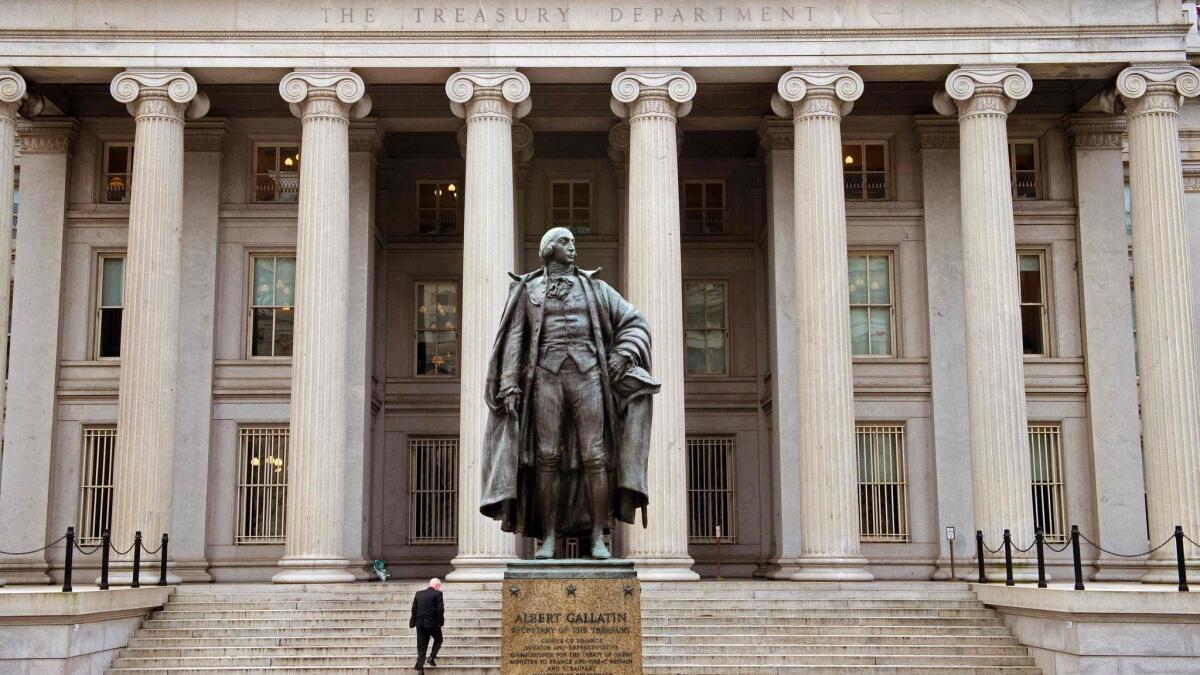U.S. record debt sales continue as deficit heads to $1 trillion

- Share via
The U.S. Treasury Department announced plans to maintain record debt sales as Republicans and Democrats continue a spending frenzy that’s widening the deficit even as economic growth remains solid.
President Trump is set to sign legislation to suspend the debt limit and boost domestic and defense spending, pushing the annual budget deficit over $1 trillion. That’s driving Treasury to keep its long-term debt issuance at a record $84 billion for the third consecutive quarter, the agency announced Wednesday. The deficit was $779 billion in fiscal 2018.
The level of issuance tops previous records set in 2009 when the U.S. was recovering from the worst downturn since the Great Depression. Borrowing is surging in the wake of Republican-backed tax cuts that have given a lift to economic growth and helped push unemployment to near a half-century low. Still, the Federal Reserve is widely expected to cut interest rates by a quarter point later Wednesday, in part because of global headwinds related to Trump’s trade war.
The bipartisan budget deal Trump struck with Congress will suspend the debt limit until mid-2021. The House passed the legislation last week and the Senate is expected to vote on it this week. The Treasury Borrowing Advisory Committee, made up of dealers and investors, urged Congress to repeal the debt limit ahead of that expiration date, according to a statement to the Treasury secretary.
“The committee strongly believes that discussions on total borrowing are more appropriately considered when making appropriations rather than when funding previously approved” spending, the TBAC said.
The Treasury said it currently anticipates no further changes in issuance sizes for nominal coupon and floating-rate securities for the rest of the current calendar year. Yet dealers predict that sales will have to increase in about 12 months.
“Treasury usually does not go beyond three months in its forward guidance, so guiding through the end of the year is a pretty strong statement,” Stephen Stanley, chief economist at Amherst Pierpont Securities LLC, said in a note.
The department also detailed changes to sales of Treasury Inflation-Protected Securities, or TIPS, over coming months as it continues plans it originally laid out last year to bolster its use of the securities.
The Treasury said Wednesday that it expects to increase the August TIPS 30-year reopening auction size to $7 billion, raise the September 10-year TIPS reopening auction size to $12 billion, and introduce the new October five-year TIPS at an auction size of $17 billion. The overall increases are consistent with the department’s prior guidance, the Treasury said.
Earlier this week, the Treasury said it plans to borrow more than twice as much as previously anticipated in the third quarter, assuming lawmakers free up spending by lifting the debt ceiling.
The department plans to issue $433 billion in net marketable debt from July through September, $274 billion more than it estimated in April, according to a statement released Monday in Washington. The pickup is coming partly as Treasury seeks to bring its cash balance up to about $350 billion, bolstering its cushion, which it drew down amid efforts to avoid breaching the debt limit.
The Treasury has been using extraordinary accounting measures to stay under the nation’s statutory debt cap after the prior suspension expired in March.
A Treasury official said in a briefing Wednesday that the department doesn’t expect any disruption in money markets as a result of the planned increase in bill sales aimed at reaching the cash-balance goal. The net amount of bill sales at about $160 billion is seen as within the limits of what primary dealers have indicated the markets can handle and is less than what was issued following the previous suspension of the debt limit, according to the official, who spoke on condition of anonymity.
“Once legislation suspending the debt limit is enacted into law, Treasury will begin the process of raising its cash balance back to levels consistent with its prudent cash balance policy, primarily through sizable increases in Treasury bill issuance,” the department said in Wednesday’s statement.
The Treasury didn’t make mention of how the coming halt of the Fed’s drawdown of its bond holdings will affect debt sales. Fed policy makers are expected to keep to the original plan of ending the balance-sheet runoff in September, according to a Bloomberg News survey earlier this month.
Emily Barrett contributed to this report.
More to Read
Inside the business of entertainment
The Wide Shot brings you news, analysis and insights on everything from streaming wars to production — and what it all means for the future.
You may occasionally receive promotional content from the Los Angeles Times.










